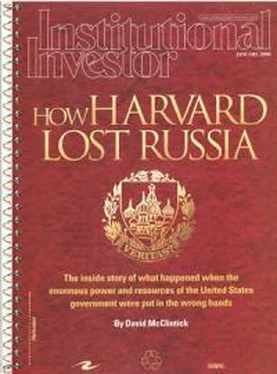The IMF-World Bank programme adopted in the name of democracy constitutes a coherent programme of impoverishment of large sectors of the population.
It was designed (in theory) to 'stabilize' the economy, yet consumer prices in 1992 increased by more than one hundred times (9,900 per cent) as a direct result of the "anti-inflationary programme". As in Third World 'stabilization programme', the inflationary process was largely engineered through the 'dollarization' of domestic prices and the collapse of the national currency. The 'price liberalization programme' did not, however, resolve (as proposed by the IMF) the distorted structure of relative prices which existed under the Soviet system."
In Ukraine and some other republics the magnitude of collapse was even greater and all middle class was essentially wiped out. Many emigrated. Also a lot of assets were simply stolen by western companies for cents on the dollar (disaster capitalism in action; some of most blatant cases were reversed under Putin, but not much). Bush II administration was busy with reelections and Clinton administration never viewed Russia as a partner only as a body on the ground to kick with a boot with impunity. As President Richard Nixon pointed out a major aid package could stop the economic free fall and help anchor Russia in the West for years to come.
In this respect the Clinton administration’s greatest failure was its decision to take advantage of Russia’s weakness. And the fact that they used puppets like Jeffrey Sachs to take advantage of the Russia situation produced a long term damage to the US strategic interests in the region. Here is a relevant quote from Foreign Affairs article “Losing Russia”:
BEHIND THE facade of friendship, Clinton administration officials expected the Kremlin to accept the United States’ definition of Russia’s national interests. They believed that Moscow’s preferences could be safely ignored if they did not align with Washington’s goals. Russia had a ruined economy and a collapsing military, and it acted like a defeated country in many ways. Unlike other European colonial empires that had withdrawn from former possessions, Moscow made no effort to negotiate for the protection of its economic and security interests in Eastern Europe or the former Soviet states on its way out. Inside Russia, meanwhile, Yeltsin’s radical reformers often welcomed IMF and U.S. pressure as justification for the harsh and hugely unpopular monetary policies they had advocated on their own.
Soon, however, even Russian Foreign Minister Andrei Kozyrev–known in Russia as Mr. Yes for accommodating the West–became frustrated with the Clinton administration’s tough love. As he told Talbott, who served as ambassador at large to the newly independent states from 1993 to 1994, “It’s bad enough having you people tell us what you’re going to do whether we like it or not. Don’t add insult to injury by also telling us that it’s in our interests to obey your orders.”
But such pleas fell on deaf ears in Washington, where this arrogant approach was becoming increasingly popular. Talbott and his aides referred to it as the spinach treatment: a paternalistic Uncle Sam fed Russian leaders policies that Washington deemed healthy, no matter how unappetizing these policies seemed in Moscow.
As Talbott adviser Victoria Nuland put it, “The more you tell them it’s good for them, the more they gag.” By sending the message that Russia should not have an independent foreign policy — or even an independent domestic one — the Clinton administration generated much resentment. This neocolonial approach went hand in hand with IMF recommendations that most economists now agree were ill suited to Russia and so painful for the population that they could never have been implemented democratically. However, Yeltsin’s radical reformers were only too happy to impose them without popular consent.
Here is the Shleifer part of the story although it is important to realize that he was just a puppet, low level criminal ( No. 6 card or "shesterka" : lowest member of a gang in Russian slang ) in the biggest looting of the century, looting that exceeds performed by Hitler armies in 40th. (Harry R. Lewis Larry Summers, Robert Rubin Will The Harvard Shadow Elite Bankrupt The University And The Country):
In 1992, Andrei Shleifer, a Harvard professor and a close friend of Summers since Shleifer's college days at Harvard, became head of a Harvard project that directed U.S. government money for the development of the Russian economy. Tens of millions of dollars in noncompetitive U.S. contracts flowed to Harvard for Shleifer's Russian work, and his team directed the distribution of hundreds of millions more. Through the mid-1990s, complaints accumulated in Washington about self-dealing and improper investing by the Harvard team, and by mid-1997, the Harvard contracts had been canceled and the FBI had taken up the case. For two years it was before a federal grand jury.
In September, 2000, the government sued Harvard, Shleifer, and others, claiming that Shleifer was lining his own pockets and those of his wife, hedge fund manager Nancy Zimmerman -- formerly a vice president at Goldman Sachs under Rubin.
Soon after, when Summers became a candidate for the Harvard presidency, Shleifer lobbied hard for him in Cambridge. Rubin assured the Fellows that the abrasiveness Summers had exhibited at Treasury was a thing of the past. They named him president--in spite of what was already known about his enabling role in the malodorous Russian affair, and the implausibility of a personality metamorphosis.
Summers did not recluse himself from the lawsuit until more than three months after his selection as president, and even then used his influence to protect Shleifer. The Fellows--including Rubin, whom Summers added to the Corporation--fought the case for years, spending upwards of $10M on lawyers. But in 2005 a federal judge found Shleifer to have conspired to defraud the government and held Harvard liable as well. To settle the civil claims, Shleifer paid the government $2M and Harvard paid $26.5M; Zimmerman's company had already paid $1.5M. Shleifer denied all wrongdoing, and Harvard disclosed nothing about any response of its own--a departure from its handling of misconduct by faculty farther from the center of power.
Summers remained close to Shleifer, yet claimed in a February 2006 faculty meeting to know too little about the scandal to have formed an opinion about it. This prevarication brought a gasp from the assembled faculty and solidified faculty opposition to the Summers presidency.
Rubin is now gone from his leadership role and his board membership at Citigroup, hauling away $126M from a firm that was $65B poorer than when he joined it, with 75,000 fewer jobs. But he remains on the Harvard board, in spite of the financial meltdowns at both Citigroup and Harvard and his poor oversight of the problematic president he persuaded Harvard to hire.
The Rubin network remains alive and well in the White House, including not just Summers but several other Rubin protégés. Among the strangest of these power loops is that the well-connected Nancy Zimmerman has turned up as a member of Summers's economic policy brain trust.
It's pretty funny that in 1993 Andrei Shleifer co-authored a paper about corruption":
Abstract
This paper presents two propositions about corruption. First, the structure of government institutions and of the political process are very important determinants of the level of corruption. In particular, weak governments that do not control their agencies experience very high corruption levels. Second, the illegality of corruption and the need for secrecy make it much more distortionary and costly than its sister activity, taxation. These results may explain why, in some less developed countries, corruption is so high and so costly to development.
Читать дальше






![Джонатан Димблби - Barbarossa - How Hitler Lost the War [calibre]](/books/385421/dzhonatan-dimblbi-barbarossa-how-hitler-lost-the-w-thumb.webp)





